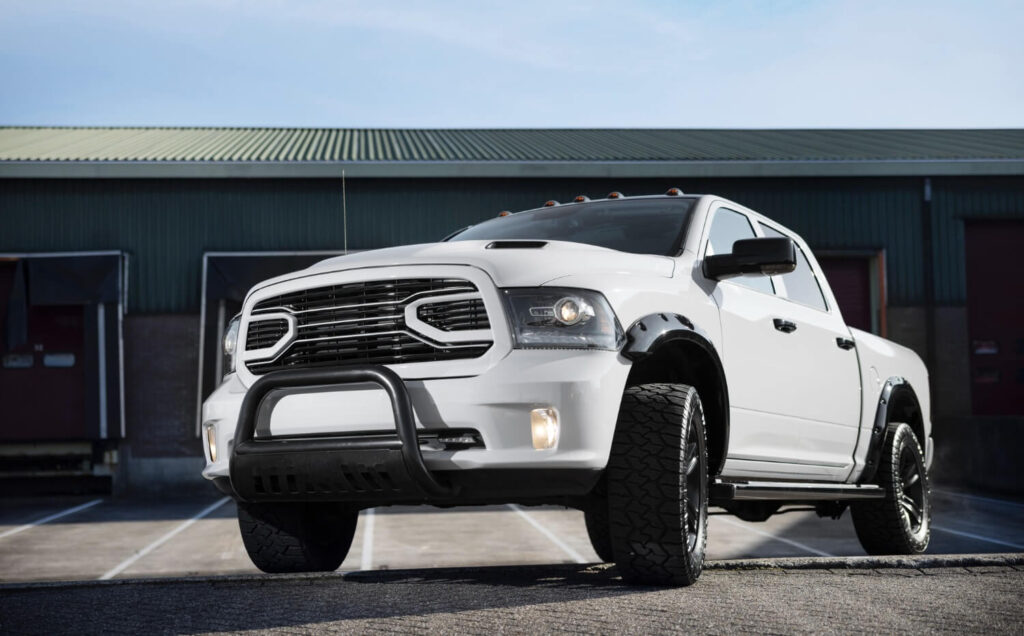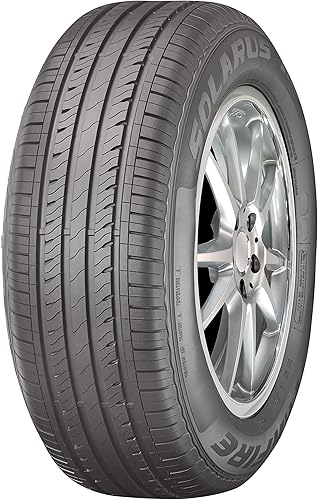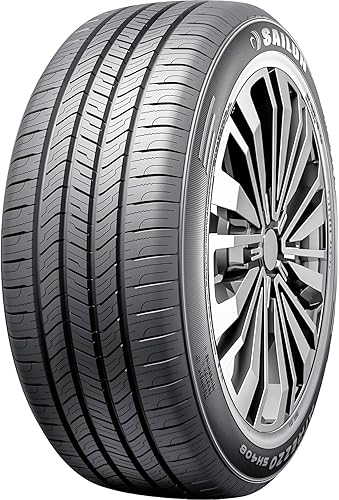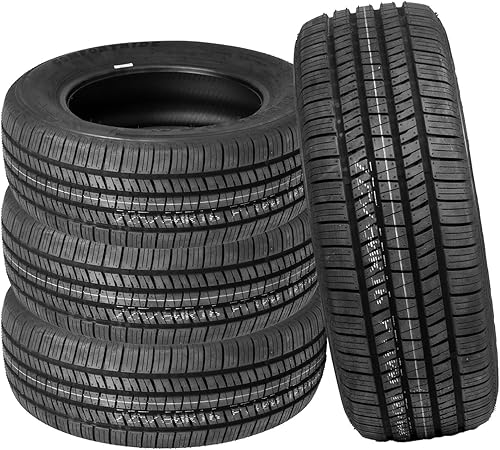Finding the best tires for Toyota Highlander isn’t as simple as grabbing whatever’s on sale at the shop down the street. You start realizing how much those four circles actually decide the whole ride—how it grips in rain, hums on the highway, or squeals when you corner a bit too quick. Some tires feel mushy, others too stiff, and then there are the ones that somehow get it just right. After hours of comparing tread patterns, sidewall strength, and real-world user gripes, the one that honestly earns its keep is the Goodyear Eagle Touring All-Season 235/55R20 102 V Tire. Quiet on asphalt, confident in the wet, and somehow still smooth after 30,000 miles – it’s the tire that makes the Highlander feel more sure of itself.
Best 5 Tires for Toyota Highlander
01. Fullway PC369 All-Season Truck/SUV Performance Radial Tires
The Fullway PC369 All-Season Truck/SUV Performance Radial Tires are designed for folks who need a reliable grip year-round without breaking the bank. Built to handle daily commutes and long highway stretches, these tires balance traction and comfort quite decently. Their tread design helps maintain road stability, even during those sudden downpours or mild winter conditions. For SUVs and light trucks that often switch between city roads and country highways, the Fullway PC369 gives a bit of both — performance and practicality.
✅ Pros:
- Strong all-season traction on wet and dry roads
- Quiet, stable ride ideal for SUVs and light trucks
- Affordable pricing for a performance-focused tire
- Durable tread design supports longer mileage
❌ Cons:
- Not suited for heavy snow or icy terrains
- May wear faster under aggressive driving conditions
- Limited brand reputation compared to premium tire makers
These Fullway tires are often compared with well-known all-season SUV tires for their dependable road grip and fair tread life. If you’re after a tire that handles everyday driving across mixed weather and won’t dent your wallet, the PC369 deserves a look — especially for mid-size trucks and crossovers aiming for a balance of price, safety, and on-road comfort.
02. Goodyear Eagle Touring All-Season 235/55R20 102 V Tire
The Goodyear Eagle Touring All-Season 235/55R20 102V Tire is one of those solid choices that somehow balances comfort, grip, and noise control without going overboard. It’s designed mainly for crossovers, sedans, and SUVs — the kind of tire that quietly does its job without fuss. With an all-season tread pattern and confident wet traction, this tire performs well whether it’s a drizzle or just dry highway miles. The handling feels stable at higher speeds, and the cornering isn’t sloppy either — something Goodyear tires are known for.
✅ Pros:
- Strong all-season traction with consistent grip on dry and wet roads
- Reduced road noise for smoother, quieter rides
- Durable tread compound offering long lifespan and reliability
- Excellent handling and corner stability, especially for SUVs and sedans
❌ Cons:
- Performance slightly drops on icy or snowy surfaces
- A bit pricier compared to other mid-range touring tires
This Goodyear Eagle Touring tire fits well for vehicles like the Toyota RAV4, Toyota Highlander, Honda CR-V, or Ford Edge, delivering a mix of everyday comfort and dependable performance. It’s built for people who want stability, less noise, and fewer tire replacements over the years — not a flashy tire, but a dependable one that earns its keep.
03. STARFIRE Solarus AS All-Season 195/65R15 91H Tire
The STARFIRE Solarus AS All-Season 195/65R15 91H Tire is a solid choice for everyday driving, designed for reliability and balance rather than flash. It’s built to handle diverse road conditions—dry, wet, or light snow—without losing traction or comfort. Drivers of sedans and compact cars like the Toyota Corolla, Honda Civic, or Nissan Sentra will appreciate its quiet tread and steady grip on highways. The tread pattern channels water efficiently, reducing hydroplaning, while the all-season rubber blend provides consistent wear life over miles of mixed driving.
✅ Pros:
- Dependable traction in dry, wet, and light snow conditions
- Smooth, quiet ride with low road noise
- Strong tread compound for longer mileage
- Great value for budget-conscious drivers
❌ Cons:
- Not ideal for deep snow or off-road terrain
- Slight drop in performance at high speeds compared to premium brands
With a good balance of comfort, grip, and affordability, the STARFIRE Solarus AS Tire remains a smart pick for daily commuters seeking a trustworthy all-season tire that doesn’t burn through their wallet.
04. Sailun Atrezzo SH408 All Season 225/65R17 102H Passenger Tire
The Sailun Atrezzo SH408 All Season 225/65R17 102H Passenger Tire is made for drivers who want steady performance without spending a fortune. It handles most weather situations decently — dry highways, sudden rain, or even light snow. The tread design focuses on even wear, reducing road noise while improving grip. It’s a balanced mix for family SUVs, crossovers, and mid-sized sedans that need consistent traction throughout the year. For daily commutes or weekend trips, this all-season tire gives a reassuring sense of control without being too stiff or overly soft.
✅ Pros:
- Strong wet and dry traction performance for everyday driving
- Quiet tread pattern that minimizes road noise
- Long-lasting rubber compound designed for even tread wear
- Affordable pricing compared to premium competitors
- Ideal for Toyota RAV4, Honda CR-V, and similar crossovers
❌ Cons:
- Not suitable for heavy snow or icy roads
- Slightly firmer ride comfort on rough surfaces
- Cornering grip may feel moderate during aggressive turns
If you’re after a tire that handles changing seasons smoothly while keeping costs manageable, the Sailun Atrezzo SH408 strikes a solid middle ground between quality, comfort, and price.
05. Suretrac COMFORTRIDE 225/65R17 Tires SL BSW 102H
The Suretrac COMFORTRIDE 225/65R17 Tires SL BSW 102H are built for drivers who value quiet comfort and dependable performance on everyday roads. With a strong emphasis on tread life and steady grip in both dry and wet surfaces, these all-season tires suit SUVs like the Toyota RAV4, Honda CR-V, and Nissan Rogue. The symmetrical tread design provides consistent wear, while the shoulder pattern helps reduce noise and vibration during long drives. Whether it’s the daily commute or a spontaneous road trip, the Suretrac COMFORTRIDE holds its own in terms of balance and reliability.
Pros:
- Solid all-season traction for SUVs and crossovers
- Low road noise and smooth ride on highways
- Competitive price point for a set of four tires
- Long tread life with reinforced sidewalls for better durability
Cons:
- Not intended for heavy off-road or snow-covered terrains
- Slightly less responsive in sharp cornering compared to premium brands
With performance tuned for comfort rather than aggression, these tires make sense for drivers who just want something that feels steady, safe, and doesn’t wear out before its time. If your priorities are a quiet cabin, even tread wear, and fuel-efficient rolling resistance, the Suretrac COMFORTRIDE 225/65R17 is a dependable and budget-friendly choice worth considering.
How to Choose the Best Tires for Toyota Highlander
It’s strange how people will spend thousands on new infotainment systems or seat covers but barely think twice about their tires. The thing actually holding your Toyota Highlander upright and steady. Tires decide how your SUV grips, stops, hums, or slips across wet asphalt. You could call them the most underappreciated heroes of your car.
What Kind of Driver You Actually Are
Before hunting for tire deals or fancy names like “All-Terrain X Ultra Max,” pause a bit. How do you really drive? Some Highlander owners hardly leave city traffic, maybe a trip to Costco, school, then home again. Others are weekend wanderers who think potholes are a test of character.
If you mostly drive on pavement, you’ll probably want all-season tires. They’re kind of the “middle child” of tires—do-everything, excel-at-nothing types. They handle rain fairly well, resist light snow, and last roughly 60,000 to 70,000 miles, depending on how tenderly you treat them.
But if you live somewhere snow falls sideways, like Michigan in January, you might want dedicated winter tires. Their tread compounds stay soft in the cold—rubber that bites ice instead of turning into hockey puck plastic. Statistically, cars with winter tires stop about 30% shorter on icy roads than those with all-season sets. That’s not marketing fluff. That’s braking distance that could decide between “wow that was close” and “insurance claim.”
Size, Load, and the Numbers Nobody Reads
Most Highlanders run tire sizes like 235/65R18 or 245/60R20. Those numbers aren’t decoration. They whisper secrets about width, sidewall height, and rim diameter. Get them wrong, and your car feels like it’s wearing clown shoes. The R means radial, which nearly all modern tires are.
Then there’s load index and speed rating, which sound dull but matter. For example, a 104H tire means it can carry around 1,984 pounds per tire at up to 130 mph. Not that you’ll ever push it that far—unless you’re late for a flight or testing physics—but staying close to factory ratings keeps handling predictable.
Don’t Ignore the Weather
If you live somewhere like Arizona, tires die from heat before tread wear. Rubber cooks, sidewalls crack, and you start noticing that faint “thump-thump” vibration. That’s dryness setting in. In contrast, Florida humidity brings mold, standing water, hydroplaning—whole different mess.
Toyota Highlander drivers in mixed climates might consider Michelin Defender LTX M/S or Continental CrossContact LX25—not as a plug, just because they balance comfort with endurance. A Consumer Reports test once ranked these high for wet braking and noise, which says something considering how quiet Highlanders already are.
Tread Patterns and Noise
Highlander cabins are hushed, so a poor tire choice will drive you nuts faster than you expect. Aggressive tread blocks look cool, but they hum like distant propellers at 70 mph. The subtle, symmetrical patterns tend to roll quieter. If your weekend trips involve gravel or trailheads, a mild all-terrain pattern works—just not the extreme knobby ones unless you’re okay losing some fuel economy.
Every decibel adds up. Studies found that highway tire noise can reach 72 to 75 dB inside midsize SUVs, roughly the sound of a vacuum cleaner. So, comfort-focused designs help your sanity.
Longevity vs. Grip
It’s almost a see-saw effect. Long-lasting tires tend to use harder rubber, which means less grip, especially in cold or wet weather. Softer tires stick like glue but melt away faster. Some brands cheat a little with silica compounds, balancing grip and durability.
If your odometer creeps up from daily commutes, something with an 80,000-mile treadwear warranty might save you replacements down the road. But if you love tight cornering, maybe settle for 60,000 and enjoy the better traction. It’s like shoes—you either go for comfort or performance; rarely both.
The Myth of Fuel Efficiency Tires
Those “eco” or “low rolling resistance” labels? They do help, slightly. Maybe a 2% to 3% improvement in fuel economy according to the Department of Energy tests. But if you inflate them poorly, that benefit vanishes overnight. Under-inflated tires can cut mileage by up to 10%. So check pressure monthly, not just when a light blinks.
Real-World Choices That Actually Fit the Highlander
From user surveys, three names keep popping up: Bridgestone Dueler H/L Alenza Plus, Michelin Defender LTX M/S, and Goodyear Assurance WeatherReady. Each has its quirks. The Bridgestone rides smoothest on highways. Michelin holds rain like a champ. Goodyear sits between both but adds a whisper of snow confidence.
The point isn’t brand loyalty—it’s matching personality. Your Highlander might be hauling kids to soccer or towing a small boat; your tire choice should match that rhythm.
The Gut Check Before You Buy
Close your browser for a second and think—when was the last time you checked your spare? Or rotated your tires at 5,000 miles like manuals suggest? Even the best tires turn useless with neglect. Tire rotation evens wear, giving you maybe an extra year of life, maybe two.
And alignment, that boring thing most shops upsell—don’t skip it. A misaligned Highlander can shred one edge of a tire down to steel cords before you even hit 20,000 miles.
So What’s “Best”?
Honestly, “best” is personal. It’s the tire that fits your roads, your temperament, and how often you ignore maintenance reminders. Maybe it’s a quiet touring tire that keeps your daily rides calm. Maybe it’s something tougher that won’t flinch when you turn off the pavement.
All that matters is you pick with awareness. Not the cheapest. Not the flashiest. Just the right one that keeps your Toyota Highlander gripping confidently, mile after mile, without begging for attention.
And if someone ever says, “tires are all the same,” they probably never had one blow out on a rainy night 60 miles from home.






